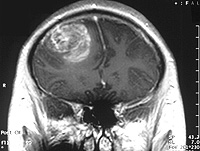According to a new study, glioblastoma (GBM) which is the most common principal malignant adult brain tumor and, regardless of treatment improvements in past years, the mean survival of patients registered in clinical trials is less than 16 months with few patients living beyond five years.
GBM tumors are categorized by angiogenesis, which is the formation of new blood vessels that support tumor growth stimulated by the GBM-produced vascular endothelial growth factor A (VEGF-A). Bevacizumab is a monoclonal antibody that seeks out VEGF-A production to obstruct the growth of tumor-based blood vessels.
"Clinical trials evaluating the addition of bevacizumab to standard treatment for recurrent glioblastoma demonstrated clinical benefit and led to the drug's U.S. Food and Drug Administration approval for this indication.” said Radiation Therapy Oncology Group 0825 principal investigator and professor of neuro-oncology at The University of Texas MD Anderson Cancer Center in Houston, Mark Gilbert, M.D.
“Additionally, compelling preclinical data suggest that anti-angiogenic targeted therapies may normalize the tumor's rapidly forming and underdeveloped blood vessels, resulting in improved oxygen and chemotherapy delivery to the tumor and potentially enhanced radiotherapy (RT) and chemotherapy treatment.”
Six hundred and twenty-one adult study participants noted in the study's final analysis were registered in the multicenter trial and randomized into one of two study arms, with treating physicians blinded to treatment assignment. All participants were treated with standard-of-care (60 Gy RT and daily temozolomide chemotherapy). Bevacizumab (experimental arm) or a placebo (standard treatment arm) was delivered starting at week 4 of RT and continued every 2 weeks until 1) disease progression, or 2) severe treatment-related toxicity, or 3) completion of adjuvant therapy. At the time of disease progression, the treatment arm was unblinded allowing for follow on treatment with or without bevacizumab.
The researchers reported data at an average follow-up time of 20.5 months, which showed no statistical difference in overall survival between the two study arms (average 16.1 months for the standard-treatment arm compared to 15.7 months for the bevacizumab arm).
While there was a difference in progression-free survival (PFS) (7.3 months for the placebo arm compared to 10.7 months for the bevacizumab arm), the pre-established level of benefit for PFS was not achieved.
"The relevant result is that the upfront use of bevacizumab is not indicated. It's important to emphasize that the question we sought to answer was whether administering bevacizumab as first-line treatment improved survival; the cross-over component allowed comparison of risk and benefit of early versus late treatment We now know by giving it late you delay the risk of toxicity, and that may be relevant,” said Gilbert.
Due to the fact that bevacizumab is known to puzzle magnetic resonance imaging (MRI) examination results used to evaluate GBM tumor progression, RTOG 0825 researchers integrated a "net clinical benefit" component in the trial design to conclude if quality of life, symptom burden and neurocognitive function test results support MRI-reported stable or improved disease status.
Over 80 percent of study participants conceded to take part in the net clinical benefits component, which revealed a higher decline of cognitive function for patients in the bevacizumab arm as opposed to those in the placebo arm.
"While we found a difference in progression-free survival in the bevacizumab arm, there was an overall increase in symptom burden and decline in neurocognitive function and some measures of quality of life over time comparing the patients receiving bevacizumab with those on placebo," noted Gilbert.
"Study participants' consent allowing the collection of tumor tissue and blood samples, as well as imaging examination, longitudinal symptom, QOL, and neurocognitive function data provides RTOG investigators a rich archive of data to support ongoing investigations of potential molecular markers to identify subgroups of patients who may benefit from early bevacizumab," said study co-principal investigator and chair of the Radiation Therapy Oncology Group Brain Tumor Committee and a professor of radiation oncology at the University of Maryland School of Medicine, Minesh Mehta, M.D.
"The RTOG 0825 results provide important insight about the use of anti-angiogenic therapies with standard first-line treatment. he unprecedented collection of specimens and associated outcome data will provide significant future information as we investigate new treatment strategies for these patients within NRG Oncology. I thank our ECOG and NCCTG colleagues for their significant trial support,” said Radiation Therapy Oncology Group chairman, co-author and executive director of the Winship Cancer Center at Emory University in Atlanta, Walter J. Curran Jr., M.D.











